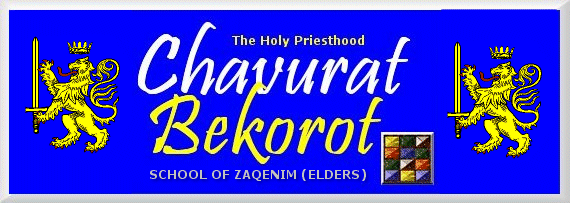

13
OLD TESTAMENT ESSAYS
 The Significance of
The Significance of
Jonathan, Joab and Hishai
(4 May 1983)
by Christopher C. Warren, M.A.(Oxon)

A. JONATHAN
Jonathan (Heb. 'Yahweh has given') was the eldest son of King Saul by his only wife (1 Sam.14:49-50), was his father's heir, which made his loyalty and affection for David more wodnerful (1 Sam.20:31). Jonathan first appears in the biblical record as the victor at geba, a Philistine stronghold, though his father's strategy at that time suggests by analogy that he may have taken part in the relief at Jabesh-gilead (1 Sam.11:11; 13:2). His prowess and courage as a warrior, recalled in David's elegy (2 Sam.1:22), are clearly seen in his lone attack on another Philistine garrison, an incident which also shows his ability to inspire loyalty as well as to offer it (1 Sam.14:7). It is for his own loyalty to David, however, that he is chiefly remembered; a loyalty made more difficult because it conflicted with his filial duty and affection to Saul, his father and sovereign. As the king, deserted by the Spirit of Yahweh and a victim to increasing fears and passions, showed ever greater hatred to "the man after Elohim's (God's) own heart" who was to succeed him, so Jonathan, in fealty to the brotherhood pact sword with David after the death of Goliath (1 Sam.18:1-4), was driven into defiance and deception of his father, even to the jeapordising of his own life (1 Sam.19:1-7,20). The parting scene between the two friends is most moving. It does not appear that Jonathan accompanied his father on the two expeditions against David, to En-gedi and Hachilah, and he disappears finally in the tragic Philistone victory at Mount Gilboa, along with his father and brothers (1 Sam.31:2). Gifted physically and morally, he is a model to those of a more favoured dispensation of loyalty to truth and friendship, as well as of that peacemaking which is the rôle of the sons of Elohim (God).
B. JOAB
Joab (Heb. 'Yahweh is father') was the son of Zeruiah, half-sister of David (2 Sam.2:18). His father's name is not recorded in the Bible, but Josephus (Antiquities 7:1.3) gives it as Suri, whose sepulchre was in Bethlehem (2 Sam.2:32).
Joab is first heard of when, with his brothers Asahel and Abishai, he led David's army to victory at Helkath-haruzzim against Ishbpsheth's rebel force under Abner (2 Sam.2:12-17). In fleeing, Abner reluctantly killed Asahel in self-defence, and was himself killed treacherously later by Joab, ostensibly in blood-revenge (2 Sam.2:23; 3:27,30), but probably also because Abner's new-found loyalty to David confronted Joab with a potential rival for the king's favour.
David was angry with his nephew for this murder, greatly scorned Abner as 'a prince and a great man', and prophesied that Yahweh would punish the killer (2 Sam.3:31-39). Nevertheless, after taking the Jebusite stronghold, Joab was made commander-in-chief of all Israel (2 Sam.5:8; 1 Chr.11:6-8), of which David was by this time king.
Jloab proved himself a skillful general who greatly helped the establishment of the monarchy, but his character was a strange mixture. Apart from his personal deeds of violence and of his opportunism, his cruelty can be seen in the way he swiftly comprehended and carried out David's plan to kill Uriah (2 Sam.11:6-26). Yet he could be magnanimous also, as when he gave David the credit after the capture of Rabboth-ammon (2 Sam.12:26-31). Perhaps most notably and surprisingly, he tried to dissuade David from numbering the people (2 Sam.24:2-4).
Joab is found in the rôle of peacemaker, reconciling David and Absalom on one occasion (2 Sam.14:23,31-33), but later when Absalom's guilt was clearly seen he had a hand in his death (2 Sam.18:14-33), despite David's injunction that the young man's life should be spared. After this David superceded Joab by Amasa as commander (2 Sam.19:13), but the resourceful Joab subdued Sheba's revolt and seized the first opportunity to slay the new commander, who had proved efficient (2 Sam.20:3-23). Thereafter for a time Joab seems to have been restored to favour (2 Sam.24:2).
In David's last days Joab's loyalty to the king faltered, and with Abiathar and others he supported Adonijah as claimant to the throne (1 Ki.1:5-53), in defiance of David, who had resolved that Solomon should succeed him (1 Ki.2:28). For once Joab had supported the wrong side, and it eventually cost him his life (1 Ki.2:34), when with the cnnivance of Solomon he was slain by Benaiah befroe the altar at Gibeon, where he had fled for sanctuary.
C. HUSHAI
Hushai (Heb. 'hasty') was a loyal Archite friend of king David who helped thwart Absalom's rebellion (1 Chr.27:33). Hushai, with his robe ripped and dirt on his head, met the fleeing king on the mount of Olives. He followed David's suggestion that he go back into Jerusalem, feign loyalty to Absalom, endeavour to frustrate Ahithophel's counsel, and keep David informed through the priests Zadok and Abiathar (2 Sam.15:20,32-37). At first Absalom was suspicious, but Hushai succeeded in winning his confidence (2 Sam.16:16-19). When Absalom called for Hushai's opinion concerning the best military strategy, Hushai spoke contrary to Ahithophel and recommended a course that would in fact allow David time to get organised. Hishai presented his idea in a way that made it appear better to Absalom and his associates then Ahithophel's advice to attack immediately. Hishai then informed the priests of what happened (2 Sam.17:1-16). Hishai's counsel frustrated that of Ahithophel, just as David had petitioned Yahweh, and thus "Yahweh brought calamity upon Absalom" (2 Sam.15:31; 17:14).
Thus the story of Hushai the Archite, his devotion to the king, and his readiness to undertake a dangerous errand for him, affords a model for study and emulation. In a list of David's officers the Chronicler includes Hushai as "a king's friend" (1 Chr.27:33; cp. 2 Sam.15:37).



This page was created on 5 August 2009
Updated on 5 August 2009
Copyright © 1987-2009 NCCG - All Rights Reserved



